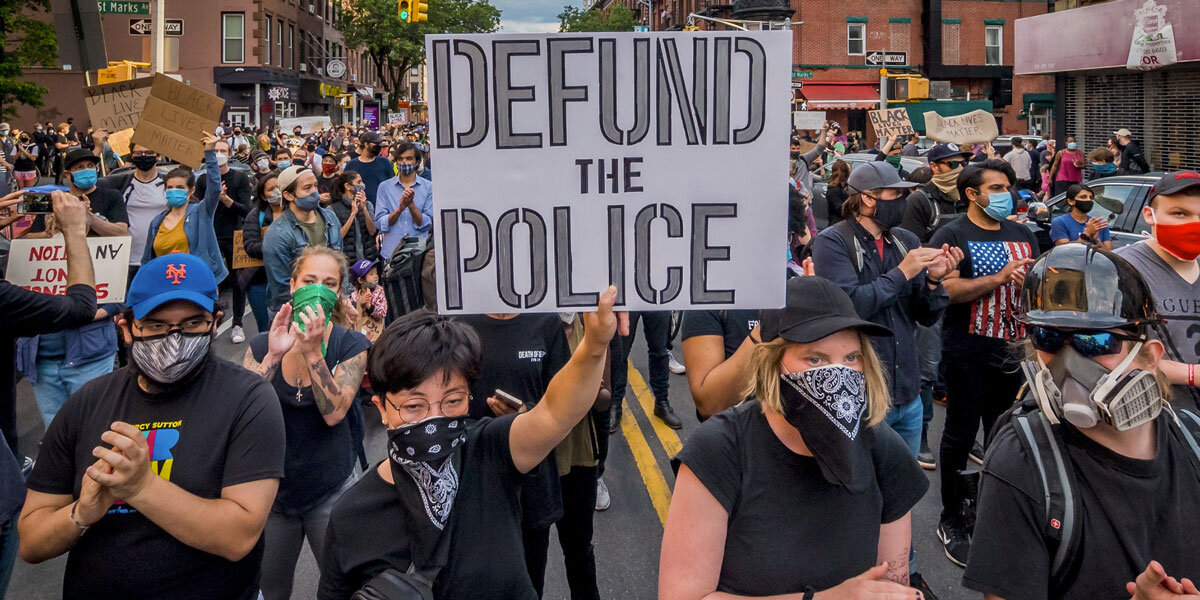Rioting has broke-out across America in 2020. Rioting is a form of lawlessness, which the Bible condemns (1 John 3:4). Even if the rioters are seeking to advance a just cause, they are going about it in a sinful way. Many elected officials across the nation have failed in their responsible to maintain law and order in their communities. Some have even help propagate lawlessness by calling for defunding the police. The riots have resulting the injury and death of dozens of individuals, as well as the destruction of public and private property, including Catholic churches and statues.
Candidate Positions

- Biden remained silent for months regarding the violence and anarchy occurring across our country.
- While Biden claims he does not support defunding the police, he is on record as supporting redirecting funding for law enforcement.

- Harris backed Minneapolis Freedom Fund which bailed-out dangerous criminal rioters.
- Harris praised violent Black Lives Matter riots in an interview, stating ‘They’re not going to let up, and they should not.’
- Harris endorsed violent riots during her acceptance speech, identifying them as a“new coalition of conscience.”
- Harris wants to decriminalize illegal border crossings.
Church Teaching
- 2403 The right to private property, acquired or received in a just way, does not do away with the original gift of the earth to the whole of mankind. The universal destination of goods remains primordial, even if the promotion of the common good requires respect for the right to private property and its exercise.
- 1906 By common good is to be understood “the sum total of social conditions which allow people, either as groups or as individuals, to reach their fulfillment more fully and more easily.” The common good concerns the life of all. It calls for prudence from each, and even more from those who exercise the office of authority. It consists of three essential elements:
- 1907 First, the common good presupposes respect for the person as such. In the name of the common good, public authorities are bound to respect the fundamental and inalienable rights of the human person. Society should permit each of its members to fulfill his vocation. In particular, the common good resides in the conditions for the exercise of the natural freedoms indispensable for the development of the human vocation, such as “the right to act according to a sound norm of conscience and to safeguard . . . privacy, and rightful freedom also in matters of religion.”
- 1908 Second, the common good requires the social well-being and development of the group itself. Development is the epitome of all social duties. Certainly, it is the proper function of authority to arbitrate, in the name of the common good, between various particular interests; but it should make accessible to each what is needed to lead a truly human life: food, clothing, health, work, education and culture, suitable information, the right to establish a family, and so on.
- 1909 Finally, the common good requires peace, that is, the stability and security of a just order. It presupposes that authority should ensure by morally acceptable means the security of society and its members. It is the basis of the right to legitimate personal and collective defense.
- 2265 Legitimate defense can be not only a right but a grave duty for one who is responsible for the lives of others. The defense of the common good requires that an unjust aggressor be rendered unable to cause harm. For this reason, those who legitimately hold authority also have the right to use arms to repel aggressors against the civil community entrusted to their responsibility.
- 2266 The efforts of the state to curb the spread of behavior harmful to people’s rights and to the basic rules of civil society correspond to the requirement of safeguarding the common good. Legitimate public authority has the right and duty to inflict punishment proportionate to the gravity of the offense. Punishment has the primary aim of redressing the disorder introduced by the offense. When it is willingly accepted by the guilty party, it assumes the value of expiation. Punishment then, in addition to defending public order and protecting people’s safety, has a medicinal purpose: as far as possible, it must contribute to the correction of the guilty party.
Related Posts
- Intellectually Honest Catholics Will Recognize Biden is Bad on Everything
- Kamala Harris Did Not Condemn Riots Until Late August
- WATCH: Biden Refuses to Condemn Antifa
- Kamala Harris Praises ‘Brilliance’ of Black Lives Matter and Its Marxist Founders
- So Where’s Joe Biden on the Issue of Church Burnings?
- Kamala Harris Promoted Fund That Helped Bail Out Man Accused of Sexually Assaulting Child
- Biden Remains Silent on Harris’ Support of Bail Fund that Helped Rioters
- Biden-Harris Launch New Ad Campaign Attacking the Police
- Kamala Harris Is Far Worse Than Hillary Clinton
- Kamala Harris Supported Bail-Out of Dangerous Criminals Along with Protesters

